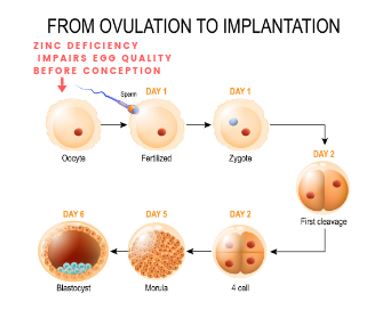Conception – Zinc’s Critical Role in Early Egg Maturation

InterClinical eNews October 2018, Issue 85
With up to 15 % of Australian couples struggling to conceive, infertility has become an important public health concern. (1) Whilst the causes of infertility may be multifactorial, researchers at Pennsylvannia State University desired to understand the role of zinc in early infertility, particularly egg quality, viability and maturation. They also sought to determine how early in the egg’s development zinc begins to affect egg quality. (2)
The Study
The researchers collected preantral follicles from mice and matured them in a culture dish, comparing zinc-deficient cells with zinc-replete controls. They added hormonal growth factor to both cell groups to mimic the hormonal changes needed for oocyte maturation in vivo and observed the oocytes growth rates, quality and viability.
Study Results
A preantral oocyte is the very early stage of egg maturation, which lasts about 90 days. This is the stage before the egg is ready for fertilisation. Zinc deficiency:
- affected the in-vitro growth rate of cells
- reduced the egg’s size in early development
- hindered the egg’s ability to divide effectively
- hampered fertility for several months despite restoration of zinc levels.
Study Conclusions
The authors discovered that zinc deficiency plays a role in oocyte development at a much earlier stage than was previously thought: i.e. during development and before cell division. They note that this has implications for fertility protocols as oocytes used for in-vitro fertilisation are routinely collected from antral follicles.
Prior to conception oocyte quality, size and viability are already affected by zinc deficiency. This implies that adequate preconception zinc is essential for healthy oocyte development.

InterClinical Comment:
This preclinical study may have implications for the quality of fertility in humans, especially in the months leading up to conception. Perhaps it would be prudent to ensure that women and men are zinc-replete as part of their prenatal preparation program and well before planning conception.
REFERENCES
- IVF Australia (About Infertility), Victorian Assisted Reproductive Treatment Authority (Fertility and infertility), Jean Hailes (Fertility and pregnancy)
- Hester JM, Diaz F. Growing Oocytes Need Zinc: Zinc Deficiency in the Preantral Ovarian Follicle. The FASEB Journal. 2018 Apr;32 (1_supplement):882-1.
Copyright InterClinical Laboratories 2018, 2020

No Comments
Sorry, the comment form is closed at this time.